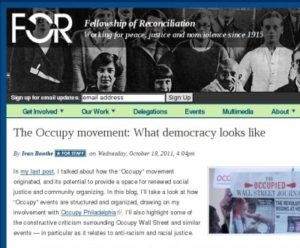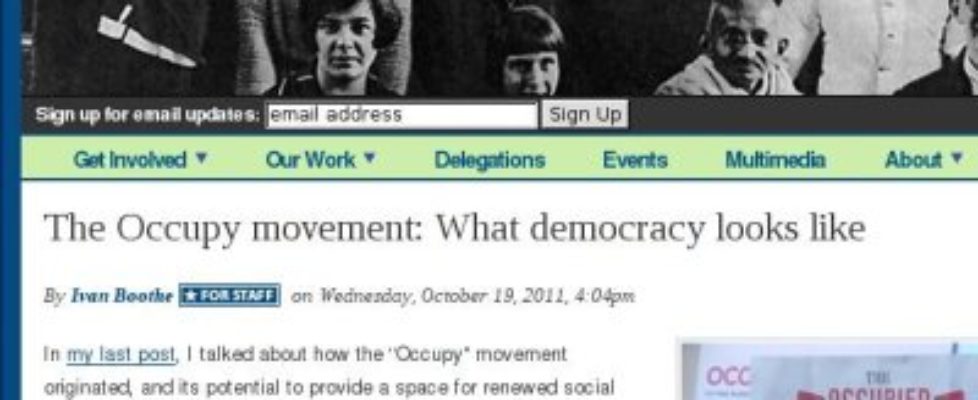Process, power and privilege in the Occupy movement
 Ivan Boothe has written an excellent post on the Fellowship of Reconciliation website. He talks about the cornerstones of the process used by the growing occupy movement in the States such as the people’s mic, consensus decision-making, and general assemblies – useful stuff about the purpose and problems associated with them, including some insights for facilitators and organisers.
Ivan Boothe has written an excellent post on the Fellowship of Reconciliation website. He talks about the cornerstones of the process used by the growing occupy movement in the States such as the people’s mic, consensus decision-making, and general assemblies – useful stuff about the purpose and problems associated with them, including some insights for facilitators and organisers.
He also talks about the racism and classism of the movement, caused in part by these very processes, and offers an analysis of its causes. Here’s a snippet, but there’s plenty more:
In an ideal community, participants would collectively decide how to debate and pass proposals, and would learn from one another about how that process operates. In most cases, however, differences in experience lead to some people having more familiarity and comfort with things like consensus and spokescouncils. Since those “some people” are usually white college-educated activists, community organizers with decades of experience among working class neighborhoods and people of color can feel culturally marginalized.
Organizers often want to undermine the traditional hierarchy of leader-oriented movements. Without adequate transparency, however, this quickly becomes the “tyranny of structurelessness,” in which existing ties between individuals become unofficial — and therefore unaccountable — decision-making structures in which others find impossible to participate.
An unfamiliar process combined with poor facilitation, poor communication, and the inevitable rush of activist planning leads to a unaware but pervasive racism and classism that makes the setup feel far more oppressive than majoritarian voting systems with which people are familiar.
He also talks of the rarely acknowledged privilege that allows people to engage in the Occupy movement:
“Occupy” encampments take an enormous amount of privilege. The privilege to take time off — from family, work or school — and participate in an overwhelming and sometimes confusing community. The privilege to, in some cases, risk arrest simply by participating. But more than anything, the privilege to debate things like “an ideal community” in the midst of life-or-death struggles going on on the ground.
I guess that applies to bloggers too!


Interactions - Creative Strategies for Business
November 14, 2011 @ 4:28 pm
[…] references an interesting post (rhizome) about the occupy wall street protests and in particular the idea of […]